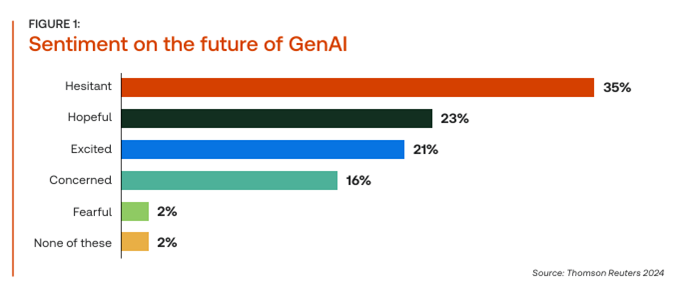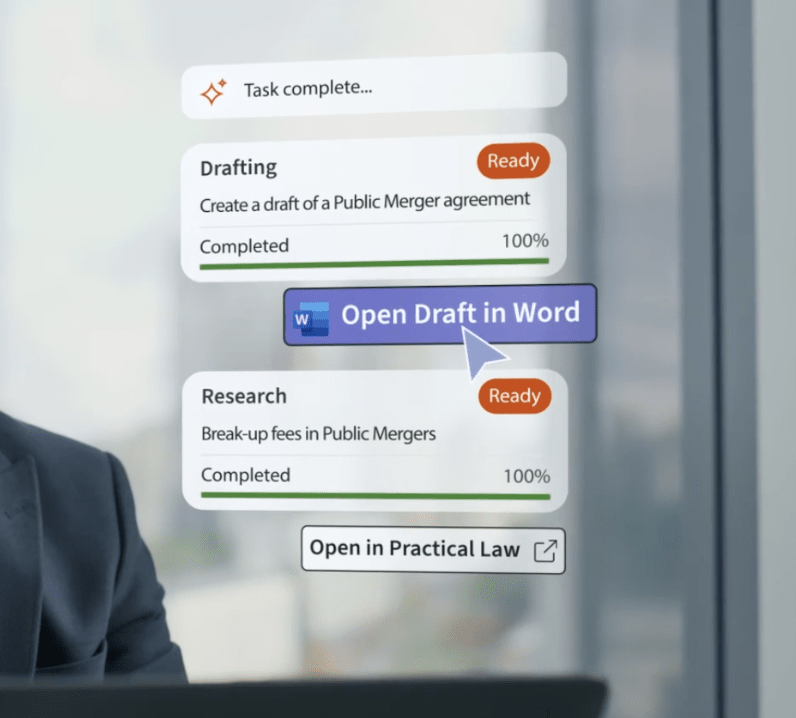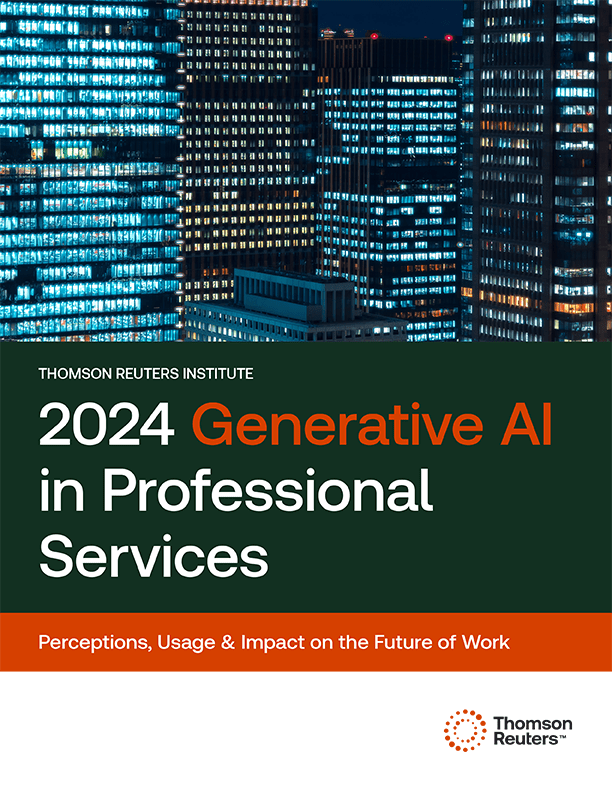All law firms can maximize the way they work with generative AI.
Generative AI can help all legal professionals stretch their idea of what technology can do and create important opportunities for growth.

CoCounsel
Bringing together generative AI, trusted content and expert insights
Meet your AI assistant ↗Jump to ↓
| What is generative AI? |
| Impact of generative AI on legal practice |
| Solo attorneys use generative AI to grow |
| Small law firms innovate through generative AI |
| Mid-size law firms use generative AI to compete on a new level |
| Global large law firms match client needs with generative AI |
| The future of legal practice with GenAI |
What is generative AI?
Generative AI is a type of machine learning that creates drafts of content like documents, images, audio, and video in response to prompts from the user. ChatGPT from OpenAI is one of the best-known GenAI tools, though several other offerings have become widely available. These tools comb through large volumes of content to create “the best” response to the prompt.
“Generative AI is smart enough to give a plausible answer to most prompts,” says Zach Warren, who leads Technology and Innovation Content for the Thomson Reuters Institute. “From there, the human using the tool should decide whether the material is accurate and edit it if necessary. It can be a great way to get a solid first draft, even for legal issues.”
Many legal professionals are already considering the use of GenAI in their legal practices. According to a Thompson Reuters report titled 2024 Generative AI in Professional Services, a large majority (81%) said GenAI can be applied to their work. A smaller majority (54%) believe GenAI should be applied to their work. The difference? Some respondents cited a lack of trust in the tools, and others feared inaccuracy or overreliance. While 35% of respondents are hesitant about GenAI, a solid 44% were either hopeful or excited about GenAI’s introduction into the legal industry.

Warren offers several ways lawyers can use generative AI to create efficiencies in their practice. For instance, you can ask GenAI legal AI assistants to write a brief or contract based on a set of facts. Once the assistant generates a draft, you check the citations, terms, and narrative, editing the draft rather than starting from scratch. You can also use generative AI tools to draft an RFP response to lighten the load in business development.
Generative AI also has the potential to synthesize large amounts of data. For instance, you can upload four contracts to a professional-grade AI assistant and ask to see the similarities and differences. You can analyze spreadsheets full of data or get plain-language answers to legal questions.
Impact of generative AI on legal practice
Generative AI is poised to create incredible efficiencies and cut down on the number of hours that lawyers work. Warren says that with a trusted tool, a legal professional could cut a task such as brief writing from ten hours to even one hour. “That means the differentiating factor for lawyers won’t be time. It will be how well people manage their cases,” says Warren.
Law firms will need to leverage their efficiency gains and still bill for the value they provide. Among the study respondents who have begun adopting GenAI, 58% said they don’t believe it will impact the rates they charge, but 39% said it will lead to an increase in alternative fee arrangements.
Using the results of the GenAI in Professional Services study, let’s look at the impact of GenAI on different-sized law firms.
Solo attorneys use generative AI to grow
Generative AI can be a powerful helper for solo attorneys looking to grow their practice. For those billing by the hour, growth is limited by the number of hours in a day. Even solos who price by the matter are limited by their ability to get through the work in a reasonable time frame. With AI-powered legal research and know-how from a trusted source, you can cut significant time from both transactional and litigation matters.
| “This is pure time savings,” Warren says. “You’re not giving different advice, but maybe you can take on more clients or do more work.” |
You may be more available to take client calls or meet with them when you are spending less time researching and drafting. You may also be better positioned to offer flat-rate pricing, which clients may appreciate.
Rather than using the extra time to take on additional clients or matters, some solo attorneys may use generative AI to deliver the same amount of work in less time. That gives them more time with family or on their own personal growth. Either way, if you’re spending less time on tasks like research or form submissions, you have more time to spend how you want to spend it.

AI news and insights
Industry-leading insights, updates, and all things AI @ Thomson Reuters
Join community ↗
Small law firms innovate through generative AI
Small law firms – those with up to 10 attorneys – also benefit from the time savings that their solo counterparts experience. They can take on more matters with their lean teams, and they can explore new practice areas more easily, especially with AI-powered know-how tools.
Small law firms that adopt generative AI early are likely to be seen as innovative and forward-thinking. Rather than waiting for the market to settle on uses for generative AI, early adopters can experiment based on the needs of the firm or the interests of the attorneys.
| “Small law firms have so much flexibility to experiment and implement new tools,” Warren says. “If you have individual attorneys who are taking the time to learn this, you’ll find there are so many more ways to use the tools.” |
While larger firms may wait on committees or consultants to approve an AI approach, smaller firms can move quickly to take advantage of the capabilities.
Small firms may also benefit more immediately because they can get more from their new associates. “Training and getting people out of law school is going to be interesting,” Warren says. “Documents, legal research, and writing contracts are tasks that can be streamlined or simplified with generative AI, and they are also tasks that most often fall to newer associates. Firms that use generative AI will be able to move new associates to more strategic work more quickly.”
New associates can also use AI to easily access and implement firm or client playbooks, reducing the review needed by partners overseeing their work.
This is a selling point for clients, who don’t want to pay to train new associates. It’s also a differentiator in hiring. Small law firms can compete better in the war for talent if they can promise less grunt work and more opportunities to work directly with partners and clients.
Mid-size law firms use generative AI to compete on a new level
Warren says that on the whole, AI can level the playing field for both small and midsize firms. “You’re competing with enterprise firms that can just throw people at a problem,” he says. GenAI can act as a force multiplier for smaller firms that don’t have armies of new associates.
Partners are particularly aware of this dynamic. “If you’ve made partner, you’re thinking strategically about cases and about what’s right for the firm and the business,” Warren says. “You’re aware of the efficiencies the tools bring, and of the way those efficiencies could lower costs or boost growth.” For an attorney eager to make a name for themselves in the firm, helping the firm learn and implement AI could be an important career booster.
“This is the time for firms to empower people who are curious,” Warren says. “Right now, the interest in generative AI is high, but adoption is low. Being the person who jumpstarts the AI initiative in your firm can be very powerful for career development.” According to the Thompson Reuters report, less than 20% of law firm respondents received GenAI training; mid-size firms and their lawyers who commit to this exercise may see a competitive advantage.
Global large law firms match client needs with generative AI
“Generative AI represents a shift in how global large law firms approach their business,” says Warren. That could mean they’ll see more client pressure to go to flat-rate pricing. Or that corporate clients could decide to keep more matters in-house. “Clients want big firms to use technology. They also don’t want to pay firms to handle things they can do themselves.”
Warren identifies this as a particular issue for global large law firms because their clients tend to be the largest corporations. Those corporations have legal teams themselves, and they are keen to manage costs as closely as possible. “Small companies may appreciate you using generative AI,” Warren says, “But large companies will expect it.”
More than half the study respondents from corporate legal departments (58%) and nearly half of the court systems (44%) said the outside firms they work with should be using GenAI.
Global large law firms will have to navigate through the same disruptive dynamics that small and mid-size firms do but on a greater scale. You will have to look at pricing models to be sure you’re capturing the value of your work product. You’ll have to look at how you onboard new associates, what work you have them cut their teeth on, and how you mentor them through the early years of their practice.
Firms may find that generative AI changes much about their businesses. Not because it replaces lawyers, but because it disrupts the status quo around billable hours, overworked associates, tedious work, and impossible goals. AI-powered technology can’t replace expertise, but combining the two significantly reshapes the way global large law firms and their clients do business together.
The future of legal practice with GenAI
“Generative AI will affect all lawyers, no matter what size firm you work for,” Warren says. He urges legal practitioners to start exploring the capabilities now and to understand how different platforms verify their results. “Don’t use something you can’t trust,” he says.
Those firms that lean into the capabilities will start to realize significant time savings and shift their approach to pricing, employee training, and retention to reduce costs and grow revenue. Solo attorneys can take on more matters without working more hours – or they can spend less time working while maintaining their income. Small and mid-size firms can compete with larger firms, either by taking on more matters or by expanding their practice areas. Global large law firms will use generative AI to keep up with their corporate clients and offer greater value in less time.
Ultimately, what’s true for every legal team is that GenAI is only as good as its source material.

CoCounsel
Apply trusted Westlaw and Practical Law content and easily reference prior work products
Request free demo ↗









